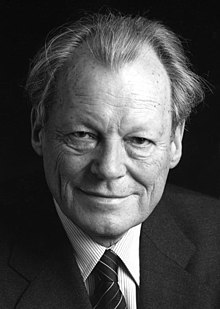Willy Brandt
Willy Brandt (born Herbert Ernst Karl Frahm; 18 December 1913 – 8 October 1992) was a German politician and statesman who was leader of the Social Democratic Party of Germany (SPD) from 1964 to 1987 and served as Chancellor of the Federal Republic of Germany (West Germany) from 1969 to 1974. In 1971, he was awarded the Nobel Peace Prize for his efforts to reconcile with the Eastern Bloc states.

Quotes
edit- Auch wenn zwei Staaten in Deutschland existieren, sind sie doch füreinander nicht Ausland; ihre Beziehungen zueinander können nur von besonderer Art sein.
- Even though two states in Germany exist, they are not foreign countries to each other—their relations with each other can only be of a special kind.
- government policy statement on 28 October 1969, p. 21 (C), https://dserver.bundestag.de/btp/06/06005.pdf (PDF file).
- Wir sind keine Erwählten, wir sind Gewählte. Deshalb suchen wir das Gespräch mit allen, die sich um diese Demokratie bemühen.
- We are not chosen by God, but by the voters—therefore we seek dialogue with all those who put effort into this democracy.
- government policy statement on 28 October 1969, p. 33 (D), https://dserver.bundestag.de/btp/06/06005.pdf (PDF file).
- Wir wollen mehr Demokratie wagen.
- We want to take a chance on more democracy.
- government policy statement on 28 October 1969, p. 20 (C), https://dserver.bundestag.de/btp/06/06005.pdf (PDF file).
- Die Zukunft wird nicht gemeistert von denen, die am Vergangenen kleben.
- Those who adhere to the past won't be able to cope with the future.
- Speech at the extraordinary convention of the Social Democratic Party of Germany on 18 November 1971, book source: "Reden und Interviews: Herbst 1971 bis Frühjahr 1973", Hoffmann und Campe, 1973, p. 25.
- In our modern world, mass hunger, economic stagnation, environmental catastrophe, political instability, and terrorism cannot be quarantined within national borders.
- Attributed in "World Government—What Are the Obstacles?", Awake! magazine article, 1984, 12/22.
- [...] ich habe es noch in diesem Sommer erneut zu Papier gebracht: Berlin wird leben, und die Mauer wird fallen.
- I put it down on paper again in the summer of this year: ‘Berlin will live, and the Wall will fall.’
- speech at the Rathaus Schöneberg in Berlin on 10 November 1989, hdg.de/lemo
- What belongs together, is growing together again.
- In 1989, as quoted in "Confederation Again" (26 July 2018), by Brian Reynolds Myers, Sthele Press
At the beginning of the 1980s the world community faces much greater dangers than at any time since the Second World War. It is clear that the world economy is now functioning so badly that it damages both the immediate and longer-run interests of all nations...
The problems of poverty and hunger are becoming more serious; there are already 800 million absolute poor and their numbers are rising; shortages of grain and other foods are increasing the prospect of hunger and starvation...
Between 20 and 25 million children below the age of five die every year in developing countries...
A number of poor countries are threatened with the irreversible destruction of their ecological systems while many more face growing food deficits and possibly mass starvation. In the international economy there is the possibility of... a collapse of credit with defaults by major debtors, or bank failures... [and] an intensified struggle for influence or control over resources leading to military conflicts.
- Attributed in "Are We Nearing Armageddon?", article on The Watchtower magazine, 1980, 10/15.
Quotes about Brandt
edit- It gives me great pleasure to congratulate you on your elevation to the high office of Chancellor of the Federal Republic of Germany. You have already done much for your people, as governing Mayor of Berlin and as Foreign Minister and Vice Chancellor. The admiration and respect you have won throughout the world in these earlier capacities promises much for the discharge of the even greater and more challenging duties you have now assumed. I think you are aware of the confidence you have won throughout the world in years.
- Richard Nixon; Letter of Congratulations to Willy Brandt on His Election as Chancellor of the Federal Republic of Germany Online, The American Presidency Project; 21 October 1969
- Brandt’s first Government Declaration promised a social programme appropriate for what he termed a new participatory democracy. But, though innovative in many respects, his strategy was to expand and consolidate rather than to introduce radical reforms of basic institutional arrangements. In any case, there was no political incentive to do so, since the existing welfare system was popular and had contributed to the economic prosperity that was so evident to the electorate. Social expenditure in the Brandt years broke loose from economic growth rates, rising from one quarter to a third of GDP, the Federal Republic becoming one of the top social spenders in the OECD. This hyperactivity, after the years of careful planning and management during the Grand Coalition, may be explained as a response of the SPD to their long absence from being senior partners in the government. For the first time in the history of the republic they were now in that position and wished to legitimise themselves in the eyes of the electorate as a sound and progressive alternative to the Union parties.
- The Federal Republic of Germany: The End of an Era edited by Ewa Kolinsky, P.228-229
External links
edit- Encyclopedic article on Willy Brandt on Wikipedia
- Media related to Willy Brandt on Wikimedia Commons